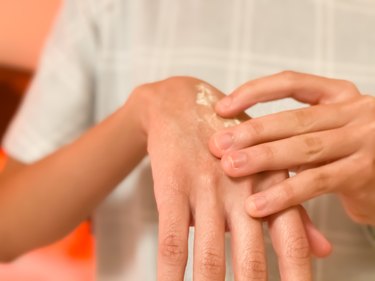
Cold weather and regularly dipping your hands in soapy water are common causes of dry, cracked hands, but a vitamin deficiency, or generally poor diet, can also contribute. Having someone else wash the dishes will make a big difference, but changing up your diet could help too.
Read more: The Best Vitamins and Supplements for Dry Skin
Video of the Day
Video of the Day
Nutrients That Nourish Dry Skin
Hands aren't cracked up to what they used to be? You can rescue them with healthy foods.
Vitamin A, vitamin B1 (thiamin), vitamin B2 (riboflavin) and vitamin B3 (niacin) all help to maintain healthy skin, according to Harvard Health Publishing. Vitamin C also helps make the collagen that helps with healing wounds, which include the cracks that can develop in dry skin. Additionally, the Harvard T.H. School of Public Health notes that the mineral zinc is necessary to create new skin cells and repair damaged ones.
Skin, hair and nail supplements may seem like an easy fix, but nutrition experts say eating healthy foods is your first priority. "A balanced diet that includes enough nutrition and calories to support skin health is absolutely the best base," says Maria Sylvester Terry, MS, RDN, a dietitian, Instagrammer and Eat Fit NOLA social media manager at Ochsner Health in New Orleans.
"Getting vitamin C from sources like berries, bell peppers, tomatoes and oranges, and vitamin A from foods like sweet potatoes, carrots, fish such as tuna, squash and broccoli, means you'll get these vitamins in combination with other skin-friendly antioxidants, she says.
"Eating pulses, whole grains and green leafy vegetables will net you B vitamins alongside valuable fiber and antioxidants. And getting zinc from foods like lean red meat, poultry, seafood such as oysters, nuts and beans will also provide essential protein that is the building block of strong, healthy skin," Sylvester Terry says.
Essential Fats Lock in Moisture
Another thing you can do to help avoid dry, cracked skin on your hands — or anywhere else on your body, for that matter — is to make sure you eat enough good healthy fat sources that provide essential fatty acids, or EFAs.
Oregon State University explains that a deficiency of the EFAs linoleic acid and alpha-linolenic acid increase the loss of water through the skin, meaning your skin can become dry and scaly. "You'll get plenty of these from consuming small portions of oil-rich plant foods such as vegetable and olive oils, walnuts, seeds and avocados daily," Sylvester Terry says.
Omega-3 fats found in oily fish can also combat skin dryness, Sylvester Terry adds. The U.S. Department of Agriculture (USDA) and U.S. Department of Health and Human Services Dietary Guidelines for Americans 2020-2025 recommend consuming 8 ounces or more per week of seafood, including oil-rich choices like salmon, mackerel, tuna and trout.
Other Ways to Protect Hands
Harvard Health Publishing says that using petroleum jelly and moisturizing oils, such as mineral oil, on cracked, dry hands is an effective and inexpensive way to moisturize them. They also note these tips to avoid dry, cracked skin:
- Use a humidifier to keep indoor air at around 60 percent moisture.
- Avoid perfumed soaps and alcohol-containing products.
- Avoid taking long hot baths.
- Resist the temptation to scratch your skin (apply moisturizer to the spot instead).
Vitamin D is thought to play a role in immune system and skin barrier function. Some observational reports have suggested the vitamin can ease itchy skin, such as the type you might get on cracked dry hands, but it's not so clear-cut. A review article in the May 2015 issue of the Journal of Clinical Medicine concluded that the jury is still out on whether the vitamin helps eczema, and more trials are needed to assess its impact on the skin.
Nonetheless, as Cleveland Clinic points out, vitamin D is generally beneficial, and it's worth making sure you get enough of vitamin D. Your skin needs to be exposed to the sun to make the vitamin; oily fish is also a good source, with canned salmon providing 13.8 micrograms of vitamin D in a 3.25 ounce serving, according to the USDA.
- Harvard Health Publishing: “Listing of Vitamins”
- Maria Sylvester Terry, MS, RDN, dietitian; Instagrammer “Vitamin_RI”; social media manager, Eat Fit NOLA, New Orleans, Louisiana
- Oregon State University: “Essential Fatty Acids and Skin Health”
- U.S. Department of Agriculture and U.S. Department of Health and Human Services: “Dietary Guidelines for Americans 2020-2025”
- Harvard Health Publishing: “9 Ways to Banish Dry Skin”
- U.S. Department of Agriculture: “Salmon, Canned”
- Journal of Clinical Medicine: “Vitamin D and the Development of Atopic Eczema”
- Cleveland Clinic: “Do You Really Need to Take Vitamin D Supplements?”
- Harvard T.H Chan School of Public Health: "Zinc"